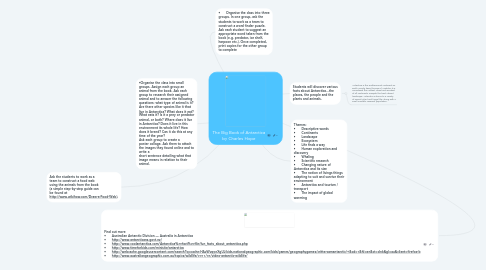The Big Book of Antarctica by Charles Hope
by Karen Pentland

1. •Organise the class into small groups. Assign each group an animal from the book. Ask each group to research their assigned animal and to answer the following questions: what type of animal is it? Are there other species like it that live in Antarctica? What does it eat? What eats it? Is it a prey or predator animal, or both? Where does it live in Antarctica? Does it live in this environment its whole life? How does it breed? Can it do this at any time of the year? Ask each group to create a poster collage. Ask them to attach the images they found online and to write a short sentence detailing what that image means in relation to their animal.
2. Ask the students to work as a team to construct a food web using the animals from the book (a simple step-by-step guide can be found at http://www.wikihow.com/Draw-a-Food-Web).
3. Find out more • Australian Antarctic Division — Australia in Antarctica • http://www.antarcticanz.govt.nz/ • http://www.coolantarctica.com/Antarctica%20fact%20file/fun_facts_about_antarctica.php • http://www.timeforkids.com/minisite/antarctica • http://webcache.googleusercontent.com/search?q=cache:HAzWvq9eXgUJ:kids.nationalgeographic.com/kids/games/geographygames/crittercamantarctic/+&cd=1&hl=en&ct=clnk&gl=au&client=firefox-b • http://www.australiangeographic.com.au/topics/wildlife/2011/03/video-antarctic-wildlife/
4. • Organise the class into three groups. In one group, ask the students to work as a team to construct a word finder puzzle. Ask each student to suggest an appropriate word taken from the book (e.g. predator, ice shelf, harpoon etc.). Once completed, print copies for the other group to complete
5. Students will discover various facts about Antarctica...the places, the people and the plants and animals.
5.1. Antarctica is the southernmost continent on Earth. Nearly twice the size of Australia, it is considered the coldest, driest and windiest of all continents. Despite the harsh desert landscape, Antarctica is home to a variety of animal, plant and fungal life, along with a small scientific research population.
6. Themes: • Descriptive words • Continents • Landscape • Ecosystem • Life finds a way • Human exploration and discovery • Whaling • Scientific research • Changing nature of Antarctica and its size • The notion of livings things adapting to suit and survive their environment • Antarctica and tourism / transport • The impact of global warming


